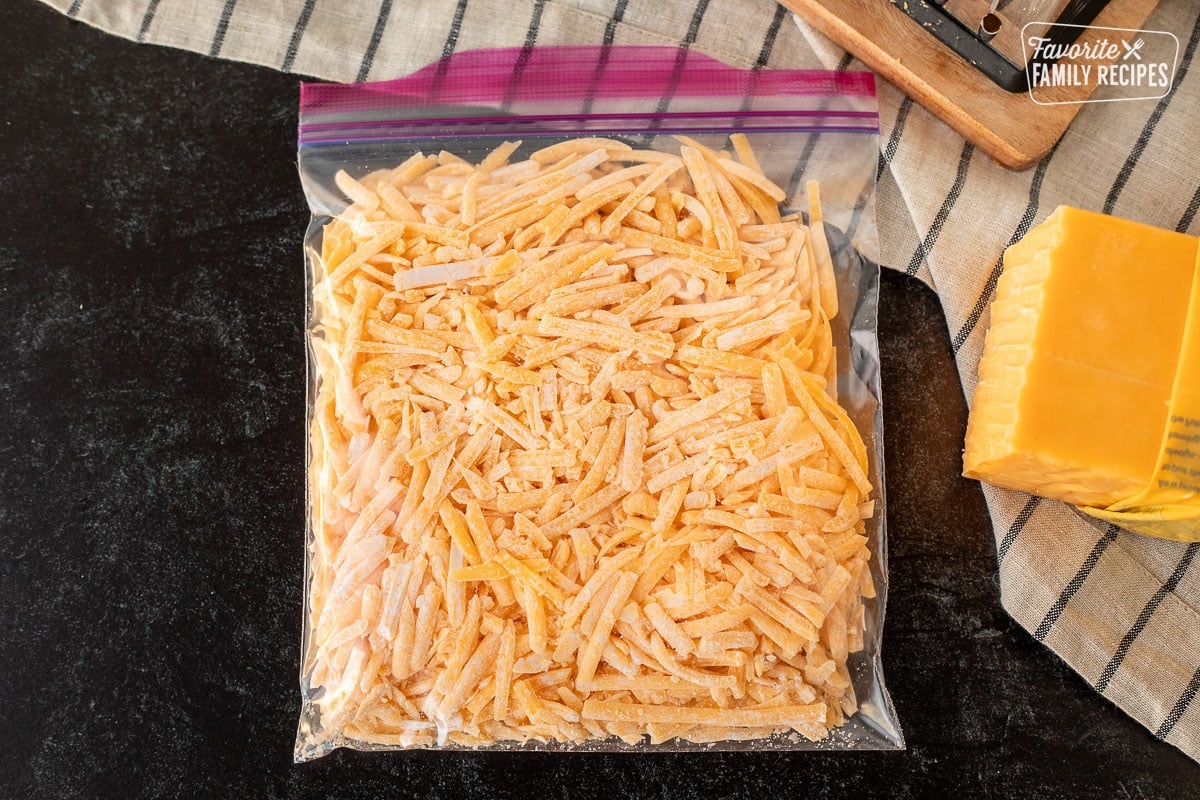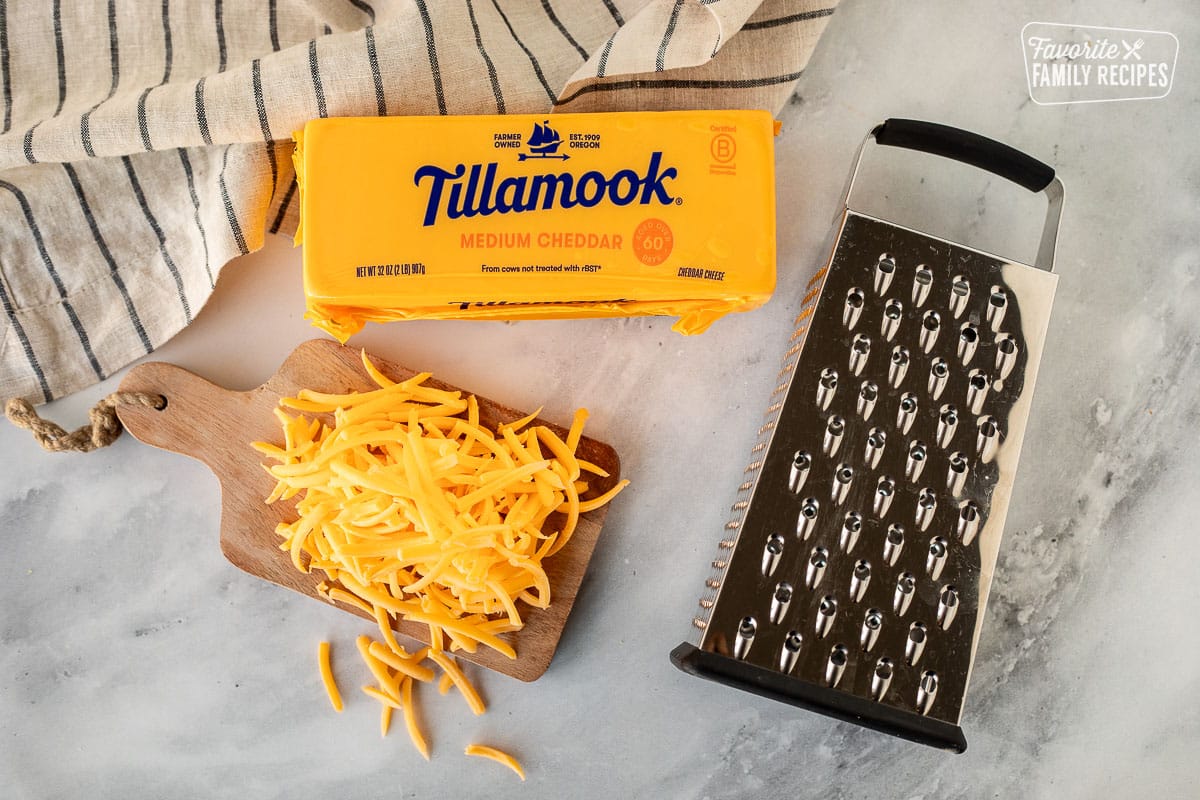This post may contain affiliate links. See our disclosure policy.
Learn how to freeze cheese properly to save money and reduce waste. Discover which cheeses freeze best, tips for storing them, and creative ways to use frozen cheese in your favorite recipes!

A Simple Guide for Saving your Cheese for Later
If you’re like me, you probably have a stash of cheese in your fridge at any given moment—whether it’s for grating on tacos, tossing on pizza, or nibbling on a cracker. But let’s face it, sometimes you just can’t finish it all before it starts to go bad. The good news? You can freeze cheese!
Yes, you read that right—cheese can be frozen and used later without a huge loss of quality. Freezing is a great way to preserve your cheese and save money, especially if you’ve bought too much or don’t want it to go to waste. But there are a few things you need to know about which cheeses freeze well, how to store them properly, and how to use frozen cheese once it’s thawed. Let’s dive into the details!
Can You Freeze Cheese?
Absolutely! Freezing cheese is a fantastic way to extend its shelf life. However, not all cheeses are created equal when it comes to freezing. Some varieties freeze beautifully, while others don’t hold up as well and can become crumbly or lose their texture. Let me walk you through the types of cheese that freeze best and the ones you should probably skip.

Best Cheeses To Freeze
The good news is that most hard and semi-hard cheeses freeze well, so you’ll have plenty of options to choose from. Here are some of the best cheeses to freeze:
- Cheddar (block, sliced, or shredded)
- Colby Jack (block, sliced, or shredded)
- Monterey Jack (block, sliced, or shredded)
- Shredded Mozzarella (great for pizza and pasta)
- Provolone (freeze in blocks or slices)
These cheeses freeze well because they have a lower moisture content, which helps them maintain their texture after thawing.
OK, But Not Great: Cheese Varieties That Can Be Frozen with Caution
Some cheeses can technically be frozen, but their texture might change, and the results can vary. These include:
- Swiss
- Blue Cheese
- Feta
- Cream Cheese
- Gouda
Worst Cheeses To Freeze
Now, there are some cheeses you’ll want to avoid freezing altogether. These cheeses have high moisture content (such as curd or soft cheese varieties) or delicate textures (such as fancy, hand-crafted cheese) that don’t fare well in the freezer. Similarly, hard varieties, such as Parmesan, don’t freeze well. They last a very long time in the refrigerator, so there’s no point in freezing them anyway. Here’s a list of cheeses that you should skip:
- Cottage Cheese
- Goat cheese
- Ricotta cheese
- Brie
- Romano
- Parmesan (Parmigiano Reggiano) or Pecorino Romano
- Processed Cheese (such as Velveeta)
These cheeses tend to break down when frozen, losing their creamy texture or turning grainy after thawing. If you have them, it’s best to use them up within their fresh shelf life.
How to Freeze Shredded Cheese (Preferred Method)
If you buy shredded cheese (or prefer to shred it yourself), it’s a great candidate for freezing. Here’s how you can do it:
1. Store-bought Shredded Cheese: You can keep the shredded cheese in its original packaging and pop it straight into the freezer.
2. Homemade Shredded Cheese: If you’re shredding a block of cheese, I recommend doing it before freezing. Shredded cheese freezes more easily and is much quicker to thaw, which is convenient for future use. See the recipe at the bottom for detailed instructions on preparing homemade shredded cheese for freezing.
You can freeze shredded cheese for up to two months before losing quality. You can thaw before using, or we have had success melting frozen shredded cheese directly into casseroles and other hot dishes.

Freezing Block Or Sliced Cheese
If you’ve got block or sliced cheese, it’s best to wrap it tightly before freezing. Here’s how:
- Block Cheese: Wrap the block tightly in plastic wrap or aluminum foil, then place it in a Ziplock freezer bag. Be sure to press out any air to prevent freezer burn.
- Sliced Cheese: For sliced cheese, separate each slice with parchment paper, then wrap and bag it just like the block cheese.
You can freeze block or sliced cheese for up to two months.
Best Ways to Use Frozen Cheese
Freezing cheese does affect its texture, and most cheeses won’t be as great for eating fresh after freezing. Here’s how to use your frozen cheese:
- Grating: Frozen cheese grates beautifully, making it perfect for sprinkling on pasta, pizza, or tacos.
- Melting: Frozen cheese melts easily, so it’s perfect for casseroles, soups, grilled cheese sandwiches, macaroni and cheese, and other cooked dishes. You can also melt sliced cheese over burgers or grilled cheese sandwiches.
- Crumbling: Cheeses like feta or blue cheese can be crumbled straight from the freezer and added to salads or baked dishes.

Tips For Thawing:
When it comes to thawing cheese, it’s best to do it slowly in the refrigerator to preserve its quality. Depending on the size of your cheese block or shred, it could take up to 48 hours to thaw fully.
However, if you’re using shredded cheese, you don’t need to thaw it at all! You can toss it directly into soups, casseroles, or any hot dish and it’ll melt just fine.
Quick Tips for Freezing Cheese
Here’s a quick TLDR version of our tips for freezing cheese, just in case you need a quick reference:
- Choose Hard Cheeses: Hard cheeses freeze better than soft cheeses. Think cheddar, mozzarella, and provolone over brie or ricotta.
- Pre-Portion: It’s a good idea to shred, slice, or cut your cheese into smaller portions before freezing. This makes it easier to thaw and use just what you need.
- Wrap Properly: Wrap cheese tightly in plastic wrap, foil, or wax paper to prevent freezer burn and keep it fresh.
- Use Freezer Bags: For extra protection, place the wrapped cheese into a freezer-safe bag and press out as much air as possible.
- Label and Date: Be sure to label your cheese with the date and type before freezing, so you know what’s what when you need it.
- Thaw Slowly: For best results, thaw cheese in the fridge. If you’re in a hurry, you can use frozen cheese in hot dishes without thawing.
- Use Frozen Cheese for Cooking: While the texture of thawed cheese may be slightly different, it’s perfect for cooking, such as in casseroles, sauces, or gratins.
- Avoid Freezing Soft Cheeses: Soft cheeses don’t freeze well, as they can separate and become crumbly when thawed.
By following these tips, you can safely freeze cheese and keep it fresh for longer, ensuring you always have a stash of cheese ready for your favorite recipes.
Can You Freeze Cheese for Long-Term Storage?
Yes! While frozen cheese is best used within 6 to 9 months for the best quality, it will technically stay safe indefinitely. Just be sure to use airtight packaging and squeeze out any excess air to keep it fresh for as long as possible.

More Uncommon Foods That Can Be Frozen
- Fresh Herbs: Chop fresh herbs and freeze them in olive oil or water for added flavor in your dishes.
- Coconut Milk: Freeze coconut milk in ice cube trays for later use in curries or smoothies.
- Cooked Pasta: Freeze cooked pasta to quickly add to soups or stir-fries.
- Bread: Freeze sliced bread or rolls for easy toasting or making sandwiches later.
- Nuts: Freeze nuts in airtight containers to keep them fresh and prevent them from going rancid.
- Tomato Paste: Freeze leftover tomato paste in small portions to use in sauces or stews.
- Buttermilk: Freeze leftover buttermilk in ice cube trays or small containers for future use in baking or marinades.
- Citrus Zest: Grate the zest of lemons, limes, or oranges and freeze it in small portions for adding bright flavor to dishes.
- Fresh Berries: Freeze fresh berries like strawberries, blueberries, and raspberries on a baking sheet before transferring them to a freezer-safe bag for smoothies or desserts.
- Cooked Rice: Freeze cooked rice in individual portions for quick and easy rice bowls or stir-fries.
- Homemade Broth: Freeze homemade broth or stock in ice cube trays or freezer bags to use as a base for soups and sauces.
- Green Onions: Chop green onions and freeze them in small portions to add a pop of flavor to various dishes.
- Fresh Ginger: Peel and freeze fresh ginger to grate or slice for recipes without worrying about it going bad.
- Pumpkin Puree: Freeze homemade pumpkin puree in portions for use in soups, smoothies, or baked goods.

Frequently Asked Questions
Freezing cheese doesn’t usually affect its flavor, but it can change the texture. This makes frozen cheese ideal for melting or cooking, but not so great for serving fresh.
Unopened cheese can last in the fridge for 4-6 weeks. Once opened, most cheeses will last about 5-7 days before they start to go bad.
Soft cheeses like cottage cheese, ricotta, and goat cheese, as well as fresh cheeses like brie and processed cheese, should not be frozen.
Recipes Using Shredded Cheese
If you’re wondering how to put all that frozen shredded cheese to good use, here are some delicious recipes to try:
Final Thoughts on Freezing Cheese
Freezing cheese is an easy way to prevent waste, save money, and always have cheese on hand for your favorite recipes. Just remember to choose the right type of cheese, wrap it well, and store it in the freezer properly. Whether you’re freezing shredded, block, or sliced cheese, you can enjoy it for months to come, ready for melting, grating, or sprinkling over your next cheesy masterpiece!
Want to learn more about freezing other foods? Check out my guides on How to Freeze Bananas, How to Freeze Avocado, How to Freeze Cookie Dough, and Freezer Breakfast Sandwiches for more helpful tips!
How to Freeze Cheese

How To Freeze Shredded Cheese
Video
Ingredients
- 1 pound cheddar cheese (store-bought, block)
- 1 tablespoon cornstarch
Instructions
- Shred cheddar cheese and place in bowl or plastic freezer bag (such as Ziplock).

- Add 1 tablespoon of cornstarch per pound of cheese to the bowl or bag.

- Combine the cheese and cornstarch by stirring in the bowl or shaking in a sealed bag until cornstarch evenly covers all of the cheese shreds.

- Transfer cheese from the bowl to the bag, if it's not there already, and press air out of the bag and re-seal tightly. To reduce freezer burn you may double bag.

- Freeze cheese for up to 2 months without losing quality. Cheese that has been frozen is best for melting into soups, casseroles, or pastas.

If we buy already shredded bagged cheese we don’t need to do the corn starch? Just throw it in the freezer ?
Yes! That should work!
So glad I won’t be wasting any more cheese. The cornstarch keeps it from clumping together. Awesome!
How much cornstarch do I put for a 2lb shredded block of cheese?
The rule is 1 tablespoon of cornstarch for every pound of cheese, so 2 tablespoons!
But why corn starch
Wow this is terrific information. I’ve had frozen cheese before and it absolutely changed the texture (…like… GROSS). Good to have these tips and tricks now to do it the right way. Thanks. Your posts are always so helpful.
what great information. thank you soo much. i am retired and yesterday my kids took me to a bulk shopping store ie sams club in tuscaloosa al. I live my by-self so i usually shop at our neighborhood wallmart as i have limited storage space. what an experience. i am now having soo much fun organizing my ftreezer and i am soo happy that i have this information. keep those great tips coming. you are awsome!!!
p
I freeze grated parmasean cheese all the time and have had very good results!
What is the cornstarch for?
It is to help the cheese not stick together when you freeze it.
I’ve been freezing cheese for a few years now, it’s my favorite kitchen hack! I haven’t added cornstarch before, but that may help me skip the freezing it on a baking sheet step which would be great
Now I know why my cheese never freezes well. This is so informative and helpful.
I freeze cheese all the time because I don’t usually get through a whole block. I’m going to try your technique using starch.
Thanks for all the tips. We aren’t big cheese eaters so when I do use it in a recipe I always have leftover that gets thrown out. Not anymore!
Had I know this, I wouldn’t have thrown out a huge amount of cheese over the years. Thank you for sharing!
Thank you for this!! I have been needing a why to freeze cheese. I like to buy in bulk but with only 2 people in the house it is hard to eat everything before it goes bad.
Cheese is my all time favorite. Your information was very interesting. Thanks
Thank you so much for providing this information! I have pinned it as well. Such a useful post.
I am so glad I found your post about how to freeze the cheese! This is super easy and will save me lots of money. I always buy cheese on special, but it last only certain time in the refrigerator and then it goes bad! Thank you for sharing this trick:)
This is so handy to know! Thanks for the great info!
Where has this tutorial been all my life!? THANK YOU SO MUCH!!!! Printing it out right now!
Old dogs (78 yrs) can learn new tricks. I never knew you could freeze nor how to do this. Plus, I get to learn how to make/cook and freeze meals. Since, I single and never did much cooking 🍳.